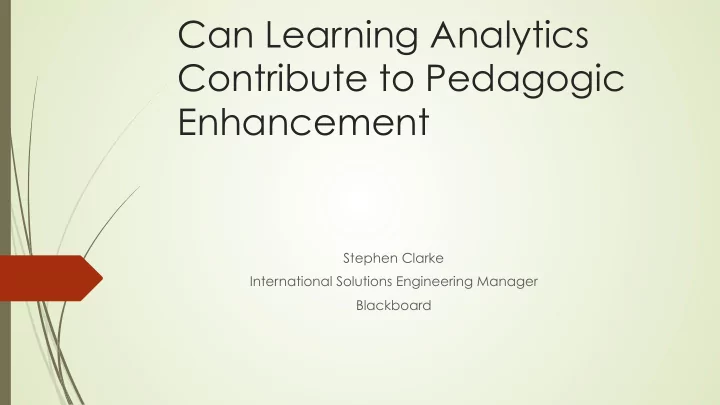

Can Learning Analytics Contribute to Pedagogic Enhancement Stephen Clarke International Solutions Engineering Manager Blackboard
The Importance of Quality “A quality education has the power to transform societies in a single generation, provide children with the protection they need from the hazards of poverty, labour exploitation and disease, and given them the knowledge, skills and confidence to reach their full potential.” Audrey Hepburn
Learning Analytics and Quality Management Quality is about how well learning is being facilitated, not solely final achievement. “YELLIS uses its own test, taken by students in year 10 or year 11, as a baseline from which to calculate value added.” Robert Coe (2007) Report for the ONS CEM Centre Durham http://www.cem.org
Learning Analytics and Institutional Quality The SoLAR Report presented “The imperative for developing a national learning analytics policy and strategy that evaluates current international practice and proposes key enabling suggestions to guide education executives and government officials in future decision making.”
Learning Analytics and Institutional Quality Well used Learning Analytics can: ´ Drive Organizational Improvement ´ Open Substantial Organizational Opportunities
What are the Opportunities? Pea, Roy; Jacks, David (2014) A Report on Building the Field of Learning Analytics for Personalized Learning at Scale https://ed.stanford.edu/sites/default/files/law_report_executivesummary_24-pager_09-02-2014.pdf
Understanding Learning Analytics Who said? “The beginning of wisdom is in the definition of terms.” Socrates
Understanding Learning Analytics What Is Learning Analytics? “Learning analytics is the collection and analysis of data generated during the learning process in order to improve the quality of both learning and teaching.” Siemens, George; Dawson, Shane; Lynch, Grace (2013) Policy and Strategy for Systems-Level Deployment of Learning Analytics Society for Learning Analytics Research http://www.solaresearch.org
Understanding Learning Analytics Learning Analytics can do many things at many levels. One of the key capabilities is the ability to compare activity with success This is valuable to learners, tutors, academic leaders and external stakeholders
Comparing Activity with Success
Comparing Activity with Success
Comparing Activity with Success
Systematic and Systemic Use of Learning Analytics For a learner and a tutor learning analytics data is invaluable Can learning analytics become equally valuable for organizational quality and improvement?
Institutional Review
Institutional Review
A Portfolio of Evidence Learning Analytics Student Student Sample Work Student Views Staff Analysis Activity Results Evidence Portfolio Academic External Accrediting Students Tutors Leaders Reviewers Bodies Stakeholders
Conclusions ´ Innovation Needs Technology “a useful teaching tool in nineteenth-century England, was transformed into a teaching necessity in the decades following 1870, when the Education Acts made school free and mandatory for all children. The resulting huge population of schoolchildren inspired the development of teaching techniques appropriate for large-group learning. Many of these techniques relied on the blackboard as a reusable demonstration space visible to the entire class at once, unlike a book or slate.” Journal of the History of Education Society, Caitlin Wylie, 201 2
Conclusions ´ Innovation Needs Technology “I’m not a fan of technology. I’m a fan of pedagogy, of understanding how people learn and the most effective learning methods. But technology enables some exciting changes.” Donald A Norman Design Lab University of California
Conclusions ´ Innovation Needs Technology ´ Correlate Multiple Factors ´ Dynamic Analysis ´ Ability to Show Trends Over Time
References Quality Assurance Agency. (2014). Handbook for Higher Education Review The Quality Assurance Agency for Higher Education Caitlin Donahue Wylie (2012) Teaching Manuals and the Blackboard: Accessing Historical Classroom Practices Journal of the History of Education Society Robert Coe (2007) Changes in Standards at GCSE and A-Level: Evidence from ALIS and YELLIS CEM Centre, Durham University Higher Education Review: A Handbook for Providers (2014) Annex3; Section 4: Assuring and Enhancing Academic Quality Quality Assurance Agency for Higher Education http://www.qaa.ac.uk/publications Pea, Roy; Jacks, David (2014) A Report on Building the Field of Learning Analytics for Personalized Learning at Scale https://ed.stanford.edu/ Siemens, George; Dawson, Shane; Lynch, Grace (2013) Policy and Strategy for Systems- Level Deployment of Learning Analytics Society for Learning Analytics Research http://www.solaresearch.org
Questions ´ Stephen.Clarke@Blackboard.com ´ Chris.Eske@Blackboard.com
Recommend
More recommend